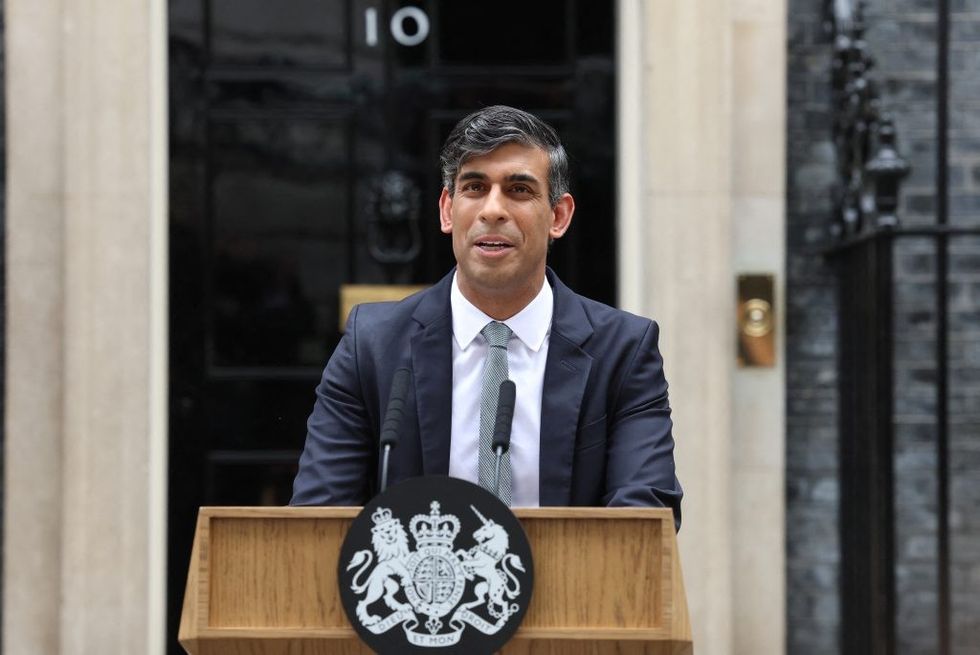Rishi Sunak concedes, saying he's sorry for defeat
Keir Starmer vowed to rebuild Britain as its next prime minister after his Labour Party on Friday surged to a landslide victory in a parliamentary election, ending 14 years of often tumultuous Conservative government.
The centre-left Labour won a massive majority in the 650-seat parliament. Rishi Sunak's Conservatives suffered the worst performance in the party's long history as voters punished them for a cost of living crisis, failing public services, and a series of scandals.
"We did it," Starmer said in a victory speech. "Change begins now ... We said we would end the chaos, and we will, we said we would turn the page, and we have. Today, we start the next chapter, begin the work of change, the mission of national renewal and start to rebuild our country."
The election result has upended British politics. Labour won some 410 seats, an increase of 210, while the Conservatives, the western world's most successful party, lost about 250 lawmakers, including a record number of senior ministers and former prime minister Liz Truss.
The Scottish National Party imploded, losing 38 seats, ending its own decade of dominance in Scotland and leaving its dream of independence for Scotland in tatters, while conversely the Irish nationalists Sinn Fein became Northern Ireland's largest party for the first time.
Meanwhile, the populist right-wing Reform UK party, headed by Nigel Farage, the colourful Brexit campaigner and friend of Donald Trump, won more than four million votes.
While it secured only four lawmakers, its impact on the outcome by siphoning vast tracts of Conservative support will make Farage a major thorn in the side of the two major parties.
Sorry Sunak
A glum Sunak conceded defeat and will meet King Charles later to formally resign before Starmer is appointed in his place.
"Today power will change hands in a peaceful and orderly manner, with goodwill on all sides," Sunak said. "There is much to learn and reflect on and I take responsibility for the loss to the many good hardworking Conservative candidates ... I am sorry."
Despite his convincing victory, polls have suggested there is little enthusiasm for Starmer or his party. Thanks to the quirk of Britain's first past the post system and a low turnout, Labour's triumph was achieved with fewer votes than it secured in 2017 and 2019 - the latter its worst result for 84 years.

The pound and British stocks and government bonds rose on Friday, but Starmer comes to power at a time when the country is facing a series of daunting challenges.
Britain's tax burden is set to hit its highest since just after World War Two, net debt is almost equivalent to annual economic output, living standards have fallen, and public services are creaking, especially the much cherished National Health Service which has been dogged by strikes.
Some of Labour's more ambitious plans, such as its flagship green spending pledges, have already been scaled back while Starmer has promised not to raise taxes for "working people".
Likewise, he has promised to scrap the Conservative's controversial policy of sending asylum seekers to Rwanda, but with migration a key electoral issue, he will be under pressure himself to find a way to stop tens of thousands of people arriving across the Channel from France on small boats.
"I don't promise you it will be easy," Starmer said. "Changing a country is not like flicking a switch. It's hard work. Patient, determined, work, and we will have to get moving immediately."
Recriminations
Within the Conservative Party, the recriminations and debate over its future direction began immediately, with some saying its failure stemmed from shifting to the right while others argued Reform had won over voters who felt the party was not right-wing enough for its traditional supporters.
"There is a massive gap on the centre right of British politics and my job is to fill it, and that's exactly what I'm going to do," said a triumphant Farage after finally being elected to parliament at his eighth attempt. "Believe me folks, this is just the first step of something that is going to stun all of you."
The growth in support for a right-wing alternative echoed recent similar results in Europe, where the far right have been surging.
But, unlike France where Marine Le Pen's National Rally party made historic gains in an election last Sunday, overall the British public has plumped for a centre-left party to bring about change.

Starmer has promised to improve relations with the European Union to resolve issues created by Britain's split from the bloc. However, despite opposing Brexit, rejoining the EU is not on the table.
He may also have to work with Trump if he wins November's presidential election. Trump has already sent congratulations to Farage, via his social media platform Truth Social.
While he has promised to bring change domestically, Starmer has vowed to continue London's unequivocal support for Ukraine in its war against Russia. On many foreign issues, his policies are similar to Sunak's.
Turnaround
The election victory represents an incredible turnaround for Starmer and Labour, which critics and supporters said was facing an existential crisis just three years ago when it appeared to have lost its way after its 2019 drubbing.
A series of Conservative scandals - most notably revelations of parties in Downing Street during COVID lockdowns - undermined then prime minister Boris Johnson and its commanding poll lead evaporated.
Truss' disastrous six-week premiership in 2022, which followed Johnson being forced out, cemented the decline, and Sunak was unable to make any dent in Labour's now commanding poll lead.
Sunak stunned Westminster and many in his own party by calling the election earlier than he needed to while trailing badly in the polls, and his campaign then proved a disaster.
"What is crystal clear to me tonight is it is not so much that Labour won this election, but rather that the Conservatives have lost it," said defence minister Grant Shapps, the most high-profile minister to lose his seat.
"We have tried the patience of traditional Conservative voters with a propensity to create an endless political soap opera out of internal rivalries and divisions, which have become increasingly indulgent and entrenched."
(Reuters)


